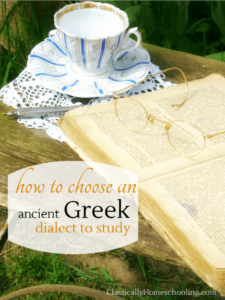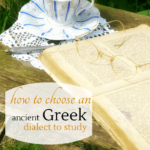How to Choose an Ancient Greek Dialect to Study
This post may contain affiliate links. For more information, please read my disclosure policy.
Choose an ancient Greek dialect to study
Are you interested in learning ancient Greek or teaching your children ancient Greek as suggested in Teaching the Trivium? First, you need to decide which ancient Greek dialect to study as ancient Greek has several: Epic, Ionic, Aeolic, Doric, Attic, and Koine.
Six Different Dialects of Ancient Greek
Let’s run through a bit of background before we move to how to choose a dialect to study.
The genre tended to determine which of the six dialects were used. If it was an epic, Epic Greek was used. Choral poetry was written in Doric.
Epic Greek or Homeric Greek was never actually spoken. It was a written only language used by ancient authors such as Homer and Hesiod. This is the first possible ancient Greek dialect to begin studying.
Ionic Greek is closely related to Attic Greek and is the form the first Greek prose appeared in. Old Ionic is the core of the Epic dialect. New Ionic is the dialect in which Herodotus and Hippocrates wrote.
Aeolic Greek is also known as Lesbian Greek. It’s the Greek dialect of Sappho and Alcaeus.
Doric Greek is the dialect family of which Sparta is a part, and was used for choral poetry.
Attic Greek was the Greek of Athens. This is the dialect of the ancient Greek plays, Aristotle, and Plato. Because of the volume of literature available in this dialect, it is commonly used in beginning textbooks.
Koine Greek is the common Greek of the Roman Empire. The New Testament was written in this dialect.
 Which Dialect to Study?
Which Dialect to Study?
Epic, Attic, and Koine are closely related and cover most of the existing classical Greek literature, so they are the ones used in beginning Greek textbooks. We’ll limit our options of dialects to ones that have courses for beginners.
The advantage of starting with Koine Greek is that you can read the New Testament quickly. Most of the courses for young children, such as Elementary Greek, begin with Koine Greek.
This is wonderful if you simply wish to reach the point of reading the New Testament. However, if you want to read Aristotle or the Greek plays, it’s harder to progress from Koine Greek to Attic Greek than Attic Greek to Koine.
Attic Greek includes Koine Greek, so by studying Attic Greek you learn Koine.
So Attic Greek would seem to be the way to go. Most of the textbooks, such as Athenaze: An Introduction to Ancient Greek, teach it. Much of our existing Greek literature is written in it. Most ancient Greek exams also test knowledge of Attic Greek.
However, Aoidoi.org argues if you wish to read other ancient works as well, you should begin with Epic Greek rather than Attic or Koine Greek. Some of the irregular conjugations and declensions are regularized in Epic Greek makes it simpler to learn.
The ancient Greek writers in Attic Greek tended to quote Homer and ancient poets. If you’re interested in learning Homeric Greek, here is a link to a free textbook: Clyde Pharr’s Homeric Greek – A Book for Beginners.
There simply isn’t an easy answer to the question of which ancient Greek dialect to study. It depends upon your goals in learning ancient Greek.
Do you wish to simply read the New Testament in the original, work towards various exams, or read all writings including Homer’s epics?
Begin your studies with the end in mind and you won’t go wrong.
Recommended Reading:









I didn’t realize that there were so many Greek dialects! “Begin with the end in mind.” That sounds like good advice. We are doing Latin right now, but I would like to do Greek later on. I see I will have a lot to consider!
I didn’t realize how many ancient Greek dialects there were either until my children and I attempted Greek a few years ago. It was an eye opening experience! 🙂